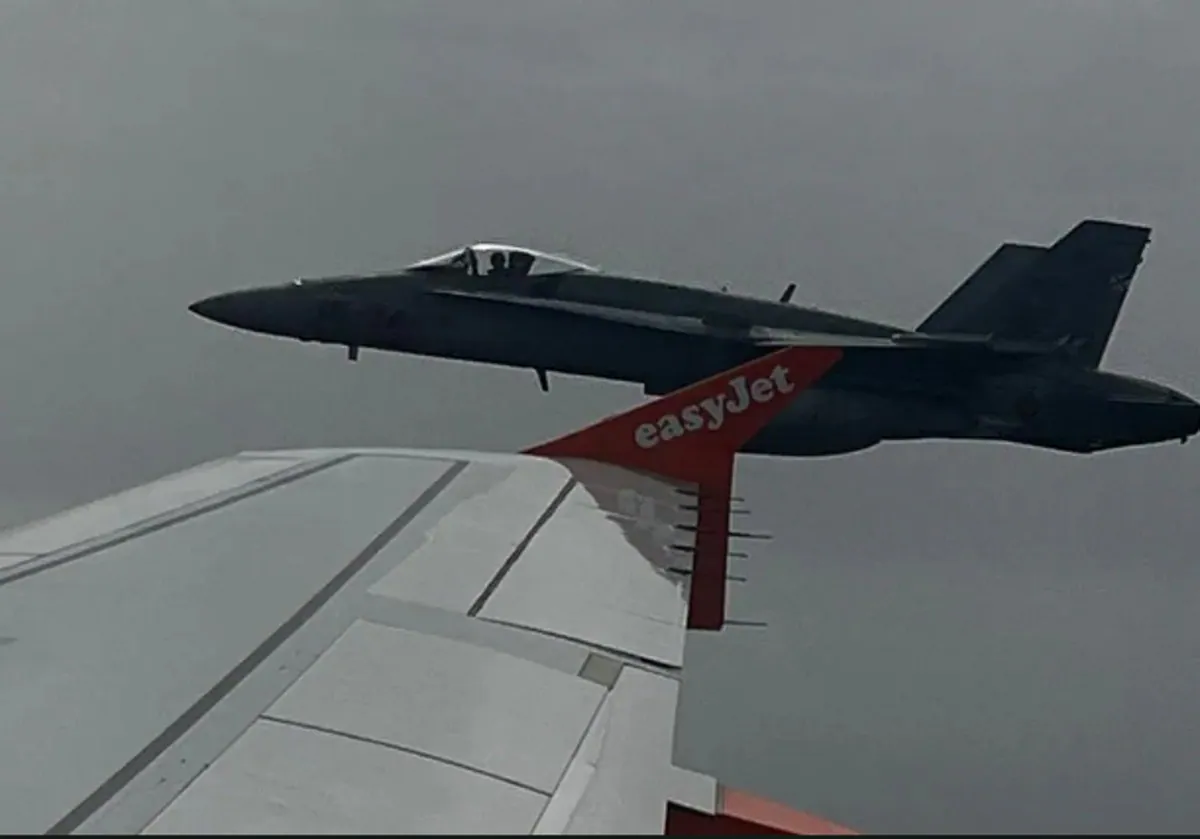British youth faces 100,000-euro bill for bomb threat 'joke' that prompted Spain to scramble a fighter plane to escort easyJet flight
The accused was checking in for a flight at London Gatwick airport when he sent a message to friends via Snapchat. It was picked up by the UK security services when the plane was flying over French airspace
M. L.
Monday, 22 January 2024, 15:17
Today, Monday 22 January, Spain's Audiencia Nacional court will try a young British man who the Public Prosecutor's Office accuses of a crime of public disorder because in July 2022 he sent a message on his social media of a fake bomb threat on a plane he was flying on, which was travelling from London to Menorca.
In the indictment, reported by Europa Press, the Public Prosecutor's Office does not request a prison sentence for him but a fine of 22,500 euros. To this figure it adds a compensation of almost 95,000 euros for the Ministry of Defence for the expenses derived from the deployment of a fighter jet that escorted the flight until it landed.
A joke to his friends
According to the account of events presented by the Public Prosecutor's Office, on 3 July 2022, Aditya Verma, the accused, was at Gatwick airport (London) at the check-in desk to for a flight to Menorca when he sent a message via the Snapchat application to the group of friends he was flying with. It showed a photograph of him and at the bottom of the image the phrase 'On my way to blow up the plane (I'm a member of the Taliban)' .
As the Public Prosecutor's Office explained, this message was picked up by the UK security services when the plane was flying over French airspace, and they alerted the Spanish authorities. With this warning, and in view of the terror threat at the time, it was decided to deploy the fighter jet to escort the flight.
Eventually, the plane landed safely at Menorca airport and the Guardia Civil arrested the young man. Despite everything, the hoax alarm did not affect the operation or normal functioning of the airport, although it was decided to park the aircraft in an area of the apron away from the terminal and other planes.
Verma has repeatedly claimed during the trial that his message was sent in a private context and with a group of friends in which he was regularly joked with because of the colour of his skin, reported Europa Press.
"I didn't think at any time about scaring the people on that flight because the Snapchat group was private"
"I didn't think at any time about scaring the people on that flight because the Snapchat group was private and that message should not have reached anyone else," he explained after saying that he and his group of friends were on their way to the Balearic Islands to party after finishing a stressful period of exams.
The young man, when questioned by his defence, said that when he saw the fighter jet accompanying the flight he thought that it could be related to the war between Russia and Ukraine given that the conflict had started shortly before. He recalled that the captain of the flight explained to the passengers of the easyJet flight that "he had made a communication error and had sent a signal by mistake but that it was being fixed and that the fighters would stop following them".
"I thought it was something to do with the conflict," he explained, denying that it had ever crossed his mind that it had anything to do with his joke.
The Guardia Civil said that when they analysed the young man's device, although they found WhatsApp conversations in which an interest was shown in the clashes between Pakistan and India and in the possibilities of an Islamic State attack in that area, they did not observe anything of interest that would link him to jihadist radicalism.
"There was no link with radicalism or any intention to plant a bomb or orchestrate it (...). It gave the impression that it was a prank", one of them said
"Pretending" to be a Taliban
The prosecutor pointed out that the defendant knew what he was doing and he was "pretending" to be a Taliban.
In its opinion, article 561 of Spain's Penal Code, which refers to false bomb threats, typified the young man's conduct, something with which the State Attorney's Office agreed, taking for granted that the capture of the message by the British security services allegedly via a wifi network was carried out legally and therefore implied "the necessary publicity which is part of the article of the Penal Code".
Defence calls for UK to pay fine
For its part, the defence lawyer indicated that the law in this respect requires the joke to be credible "and this was not the case". The defendant "had no intention of mobilising the emergency services, it was a private joke", he stressed.
The defence pointed out that the fine demanded of his client is disproportionate and that the cost should in any case be borne by the British Government "for violating the privacy" of the individual.
